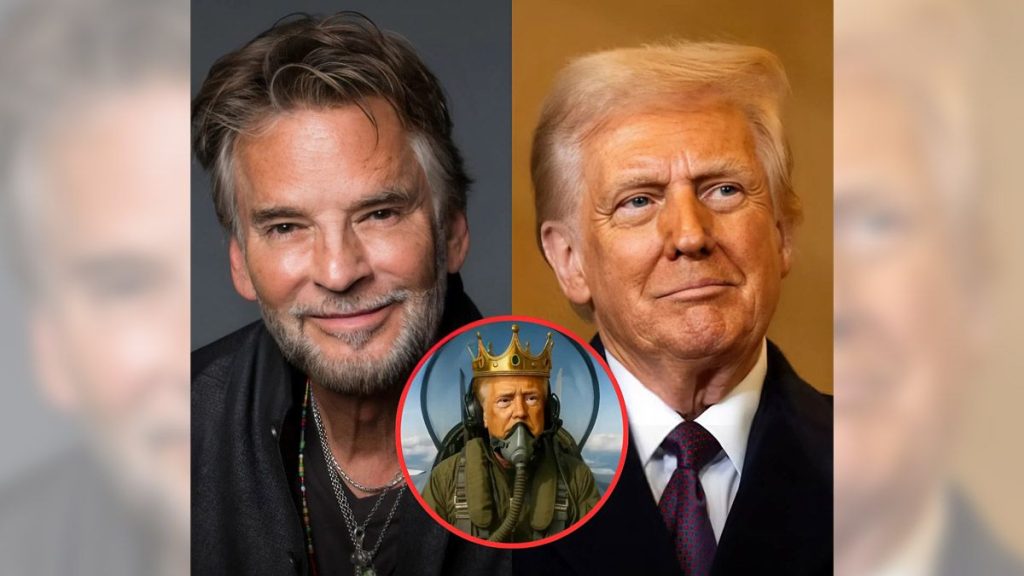Listen to the article
In a swift response to a controversial AI-generated video, singer-songwriter Kenny Loggins has publicly demanded the removal of his iconic song “Danger Zone” from content shared by former President Donald Trump, though rumors of a massive lawsuit have proven false.
The controversy began on October 18 when Trump posted an AI-generated video on his Truth Social platform. The clip depicted Trump wearing a crown, flying a fighter jet labeled “King Trump,” and dumping excrement on protesters. The video, which incorporated Loggins’ 1986 hit song from the “Top Gun” soundtrack, was shared the same day millions participated in worldwide “No Kings” protests against Trump’s administration.
Loggins quickly responded with an official statement on his website, condemning the unauthorized use of his music. “This is an unauthorized use of my performance of ‘Danger Zone.’ Nobody asked me for my permission, which I would have denied, and I request that my recording on this video is removed immediately,” the statement read.
The musician further expressed dismay at the divisive nature of the content, adding, “I can’t imagine why anybody would want their music used or associated with something created with the sole purpose of dividing us. Too many people are trying to tear us apart, and we need to find new ways to come together.”
Following this incident, false claims began circulating across social media platforms that Loggins had filed a $900 million lawsuit against Trump. The rumor spread widely on Facebook, Instagram, Reddit, Threads, and X (formerly Twitter), with a particularly viral meme from a page called Liberty & Vision claiming “Breaking News: Kenny Loggins Sues Trump for $900M Over Unauthorized AI Use of ‘Danger Zone.'”
An investigation into these claims revealed no credible news sources reporting such a lawsuit. Major news outlets, which would typically cover such a high-profile legal action, have been silent on the matter. The only related legitimate news came from TMZ, which cited an anonymous source claiming Loggins “is exploring legal options to ensure Trump stops using his music.”
The false lawsuit story appears to have originated from social media accounts managed from outside the United States. According to Facebook’s “page transparency” information, the Liberty & Vision page, which heavily promoted the rumor, is managed by individuals in Poland, Vietnam, and Bangladesh. These accounts linked to advertisement-filled articles with hallmarks of AI-generated content, suggesting the fabrication was designed to generate advertising revenue.
This incident represents the latest chapter in an ongoing issue facing musicians whose work is used in political campaigns without permission. Numerous artists have publicly objected to the use of their music at political rallies or in campaign materials, particularly in relation to Trump’s campaigns and presidency.
The controversy also highlights the emerging challenges posed by AI-generated content in political discourse. As artificial intelligence tools become more accessible, questions about copyright, permission, and the appropriate use of artistic works in manipulated digital content are becoming increasingly complex.
While Loggins has not filed a lawsuit as falsely claimed, his public statement indicates his strong opposition to the unauthorized use of his music, especially in content he views as divisive. The Associated Press has confirmed Loggins’ demand for the removal of his song from Trump’s video, though there has been no public response from Trump or his team regarding this request.
As of now, it remains unclear whether Loggins will pursue legal action or what other steps might be taken to address the unauthorized use of his intellectual property.
Fact Checker
Verify the accuracy of this article using The Disinformation Commission analysis and real-time sources.




13 Comments
It’s good to see that the report has clarified the true nature of this situation, rather than allowing misinformation to spread. Fact-checking is a valuable service to the public.
While the unauthorized use of Loggins’ music is concerning, I’m glad to see the focus is on the facts rather than unsubstantiated rumors. Keeping the discussion grounded in reality is important.
The report seems to clarify that the rumors of a $900M lawsuit were false. It’s good to see the facts being set straight on this matter.
Yes, fact-checking is important to prevent the spread of misinformation, especially around high-profile figures and events.
Interesting to see Loggins take a stand against the unauthorized use of his music. As an artist, I can understand his desire to control how his work is portrayed and associated.
Agreed. Artists should have a say in how their creations are used, especially in political contexts that could be seen as divisive.
The report highlights the importance of verifying claims, especially when they involve high-profile individuals and potential legal action. Fact-checking is crucial in the age of social media.
The response from Loggins highlights the complexities that can arise when artistic works intersect with politics. Navigating those waters requires care and consideration from all parties involved.
It’s understandable that Loggins would want to distance himself from any association with divisive political content, even if it’s just through the use of his music.
Absolutely. Artists often aim to keep their work neutral and avoid being drawn into polarizing political debates.
This situation serves as a reminder that artists have the right to control the use of their creative work, even if it’s used in political contexts. Loggins’ response seems reasonable and appropriate.
While I can understand Loggins’ position, I wonder if there are any legal or contractual nuances around the use of his music that could impact this situation.
That’s a good point. There may be complex licensing and usage agreements involved that could affect his ability to control the song’s usage.